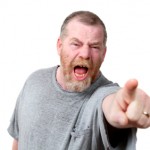Heard on the Street
Cathy and I were driving through Downtown Minneapolis today, after celebrating our anniversary. We pulled up beside a taxi cab, and then witnessed a pedestrian, a stocky guy about 50 years old, lashing out at the cabdriver for nosing into the crosswalk. He was enraged, he was loud, and he was vaguely threatening. Among his invective was the following statement: “This isn’t Somalia, you know!” He elaborated on that theme.
I rolled down my window, glared at the guy, and said nothing. He kept ranting as he continued down the street.
First, I believe that the pedestrian’s ranting constituted genuine hate speech, and that it called for a response from someone able to respond. I was able to respond, and chose not to. I didn’t want to risk his attacking us in our car, nor did I want to spring from the car, making a fight more likely. It is reasonable and appropriate to balance duty with risk and reward. On balance, telling him loudly and clearly to stop his racist ranting would have been better than remaining silent. I must conclude that my silence reflected a failure of courage.
I am still somewhat troubled by this event. I know that we cannot change the past; we can, and should, learn from it.
I remind audiences: rarely can we predict the need for courage. This means both that there are indeed moments of truth, and that we ought to seek moral clarity in advance of such moments. This morning I let a moment pass, and when my anger at the bigot subsided, I was left feeling a bit disappointed in myself. In Profiles in Courage, John F. Kennedy highlights this self-regard as a key factor in promoting courage. He argues that his subjects, primarily 19th Century Senators, risked personal ruin in part to preserve that sense of themselves as moral and courageous. Perhaps I will remember my own sense of disappointment when future moments arise. My calculations will more prominently include the impact of proper action on my sense of self.
Some sense of perspective is in order: after all, nobody died. Harsh words were exchanged. It is also important to consider a momentary lapse along with other acts that more fully represent the person I strive to be. The aim of this exercise is neither self-abuse nor self-denigration, but self-improvement. It can also make me more cautious, or more charitable, in my judgement of others.
The goal, in short, is encouragement, in the truest sense of that term.
It’s good to have a blog. Thanks for joining me.


Leave a Reply
Want to join the discussion?Feel free to contribute!